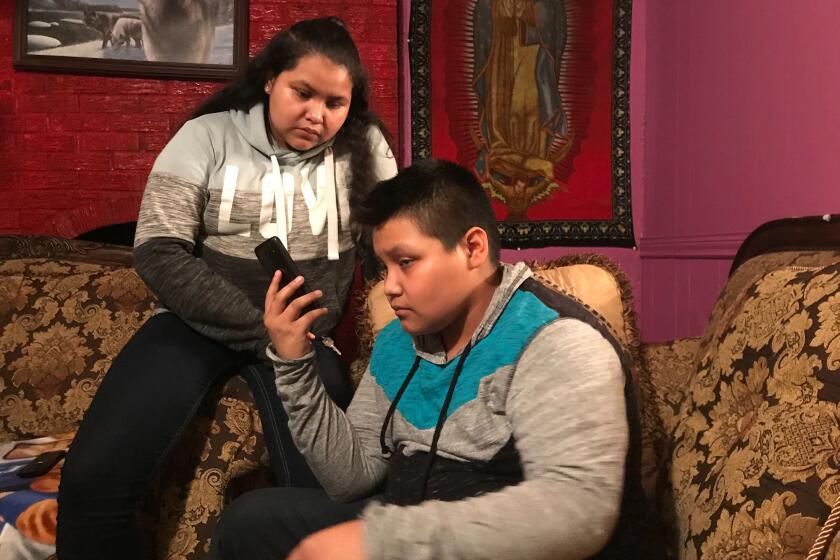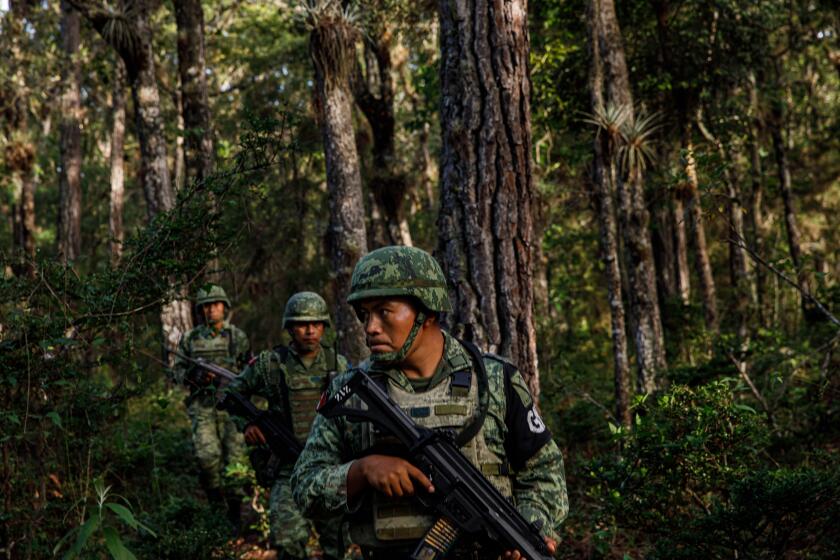A Mississippi church counts its missing after ICE raids: ‘This is a very dark moment’
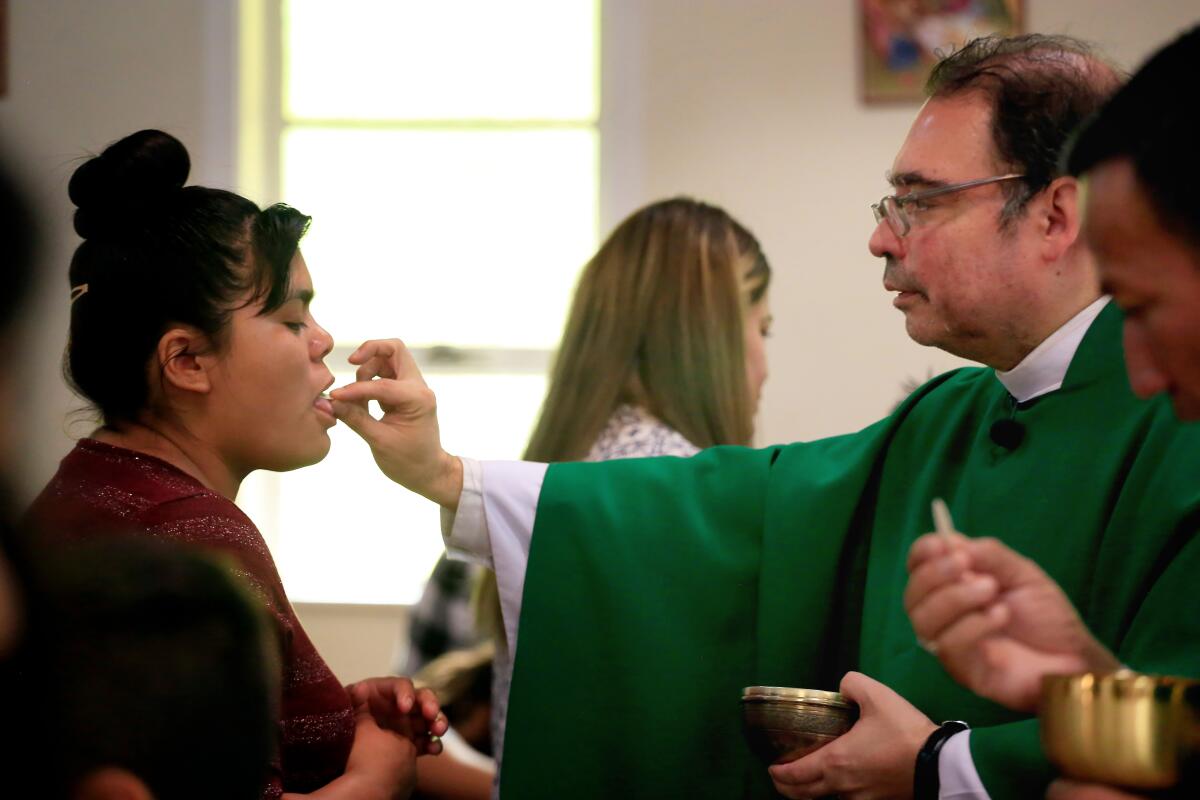
- Share via
FOREST, Miss. — Stepping into his humble sanctuary as the wooden pews filled for Mass, Father Roberto Mena touched his right hand to his forehead, chest and shoulders, making the sign of the cross before he gazed on what was left of his community.
His lector, who read scripture, was gone, along with four of the lead singers of his choir, two Eucharistic ministers who helped him administer the sacraments of Holy Communion and nearly half of his parishioners.
In the very back pew, a father rocked his 4-month-old daughter, Jacqueline, who had been breastfeeding until the sudden disappearance of her mother.
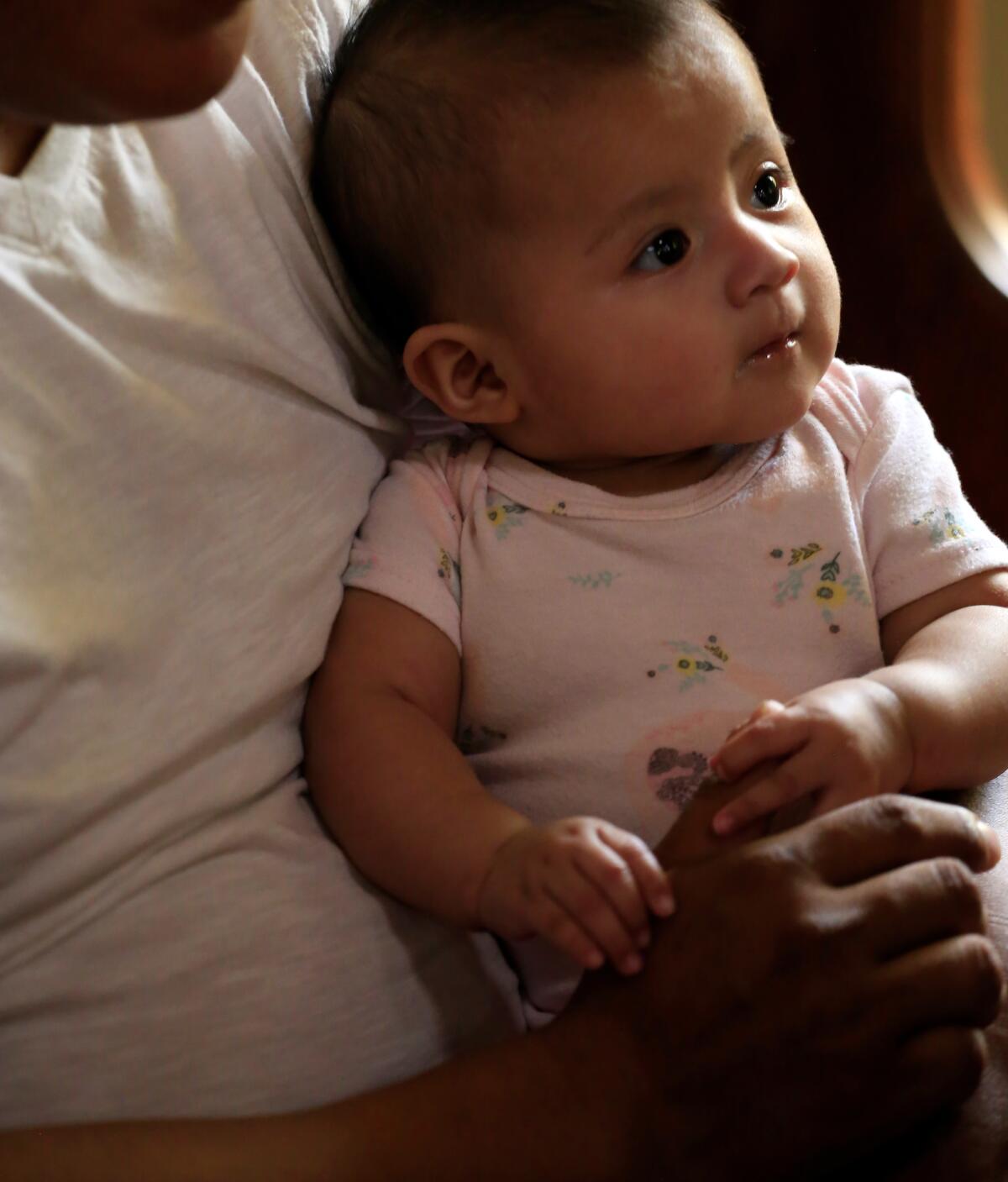
Locked up in Immigration and Customs Enforcement detention centers, the missing parishioners were among hundreds of immigrant workers rounded up by federal agents earlier this month in a string of raids at poultry processing plants across central Mississippi. In total, Father Mena estimates his parish has lost about 150 members.
A new form of family separation leaves children of immigrant workers wondering when they will see their parents again.
St. Michael Catholic Church, a small brick structure adorned with a simple white cross and a stained-glass window depicting the Virgin Mary, has long been a refuge for Latinos in this tiny Southern town, population 5,600 – a place not just to worship and gather for baptisms and christenings, but to speak Spanish and find fellowship with other families who have journeyed to the U.S. from Latin America.
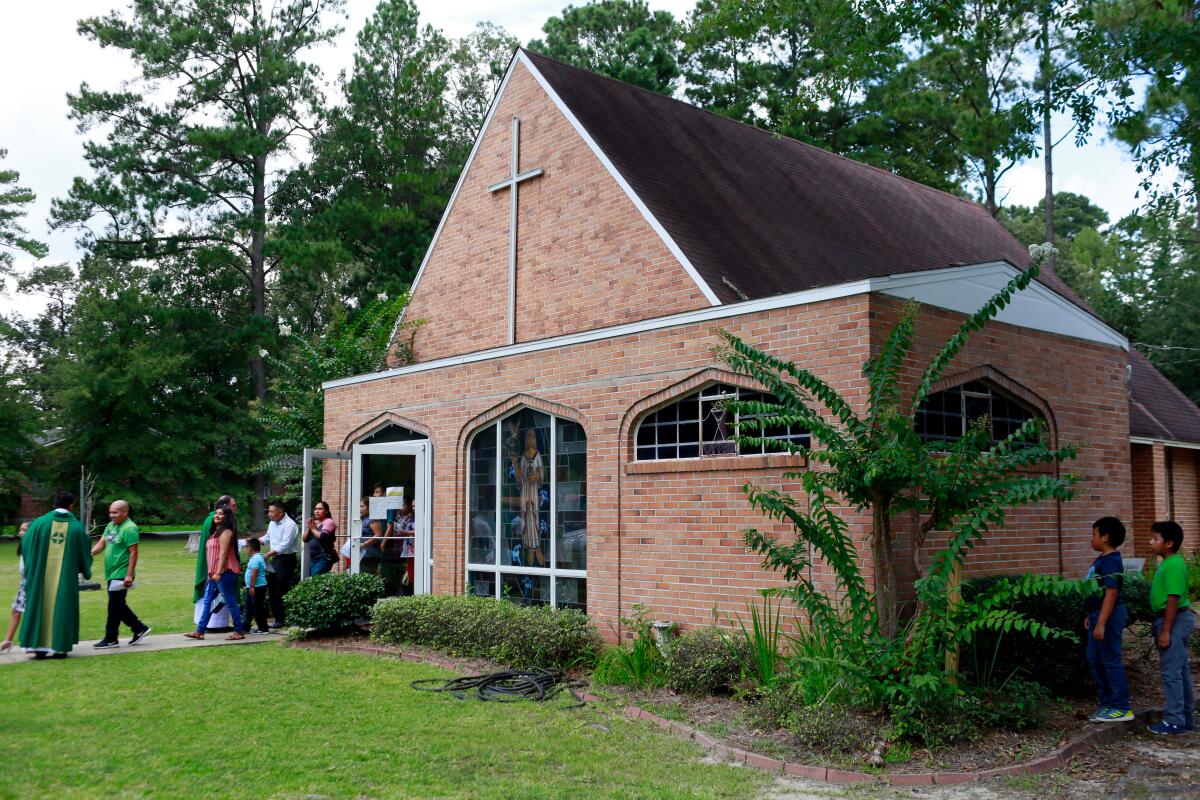
In the days since the raids, St. Michael has become a makeshift emergency center, a place where families now gather to ask a litany of questions: Where are their loved ones? What are their legal options? Where can they find work if the chicken plants are checking more closely before hiring workers who lack legal status? Without steady paychecks, how will they pay their rent and utility bills and put food on the table?
Mena, a 52-year-old Guatemalan priest, has offered prayers and comfort. He has also provided practical assistance, opening up St. Michael’s parish hall to a network of attorneys and psychologists offering pro bono legal advice and trauma counseling.
In his modest wood-paneled office, decorated with a painting of Our Lady of Guadalupe and a photo of Pope Francis, he has a fat stack of letters of recommendation to immigration judges for members of his congregation.
So far, he has typed up 80. But he has not had any response and he worries about the fate of the detainees as well as their families that are left behind.
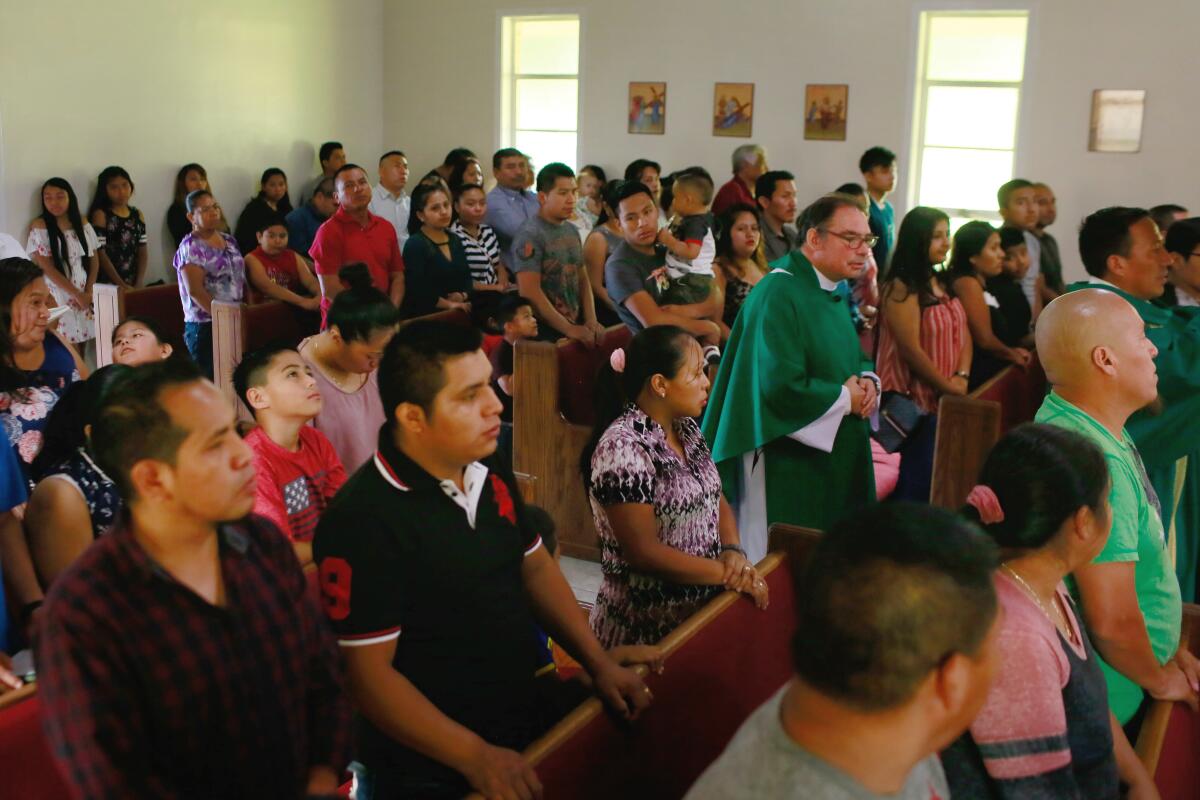
While ICE released 303 of the 680 immigrants within 24 hours, the majority remain in Louisiana detention centers with little hope of release in the near future. And the hardship is not over for those who are back in the community: Not only were they handed papers to appear before a federal immigration judge, but many of them no longer have jobs.
Six days after the raids, word spread that PH Food, a chicken processing plant in nearby Morton, had fired most of its remaining workers. Desperate, more than 100 members of the community congregated at a park, complaining the company had abruptly terminated them at the end of their shift and was illegally withholding their last paychecks.
“This is a very dark moment in their lives,” Mena said. “They don’t see their future as something bright. Many of them are left thinking it was not a good decision to come to the United States, but their children are now used to this society’s customs and its way of thinking. To go back to Guatemala, where there is a lot of poverty and violence, is not going to be easy.”
Over and over, Mena has met parents who are struggling to cope. One mother of six children is at her wits’ end, he said, trying to care for her autistic and hyperactive 7-year-old son, Nery. Her husband was not just the family’s sole breadwinner, but the only member of the family who could calm their son down. Without his father, Nery is becoming more aggressive and refusing to go to school or take his medicine.
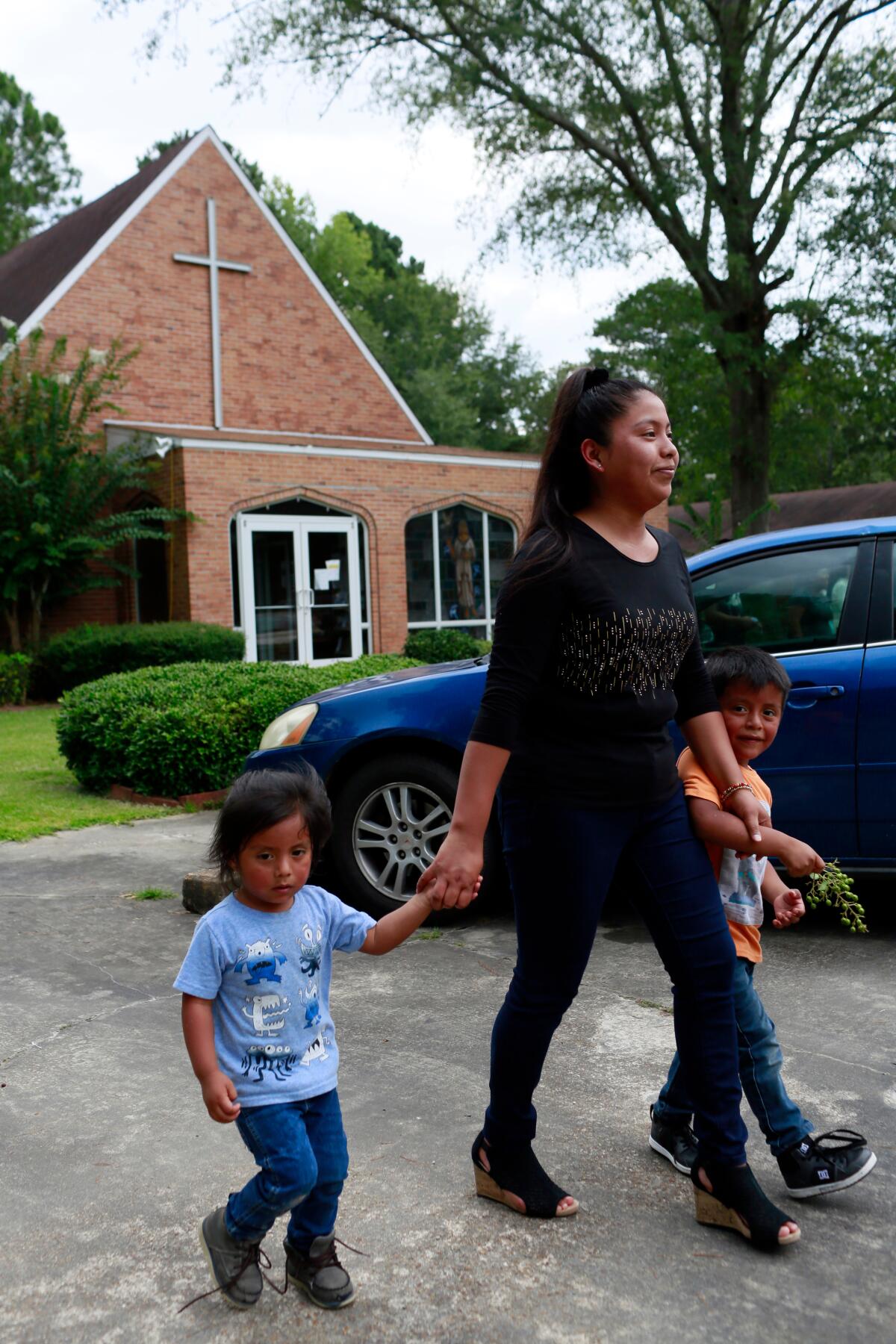
Then there is baby Jacqueline, who arrived at church Sunday, all smiles in a pink onesie festooned with flowers. Ever since her mother, Maria, was locked up, her father, who did not want to share his name because he is living in the country illegally, has cared for Jacqueline, who is teething, as well as two boys, ages 3 and 11.
With no extended family in Mississippi to help out, he is relying on a neighbor to look after the kids while he works four hours a day as a landscaper.
His own future in the U.S. is not much more secure than his wife’s: A Guatemalan citizen in the U.S. illegally, he faces his own deportation proceedings after having been arrested two years ago for driving without a license. A court hearing is scheduled for 2021.
Over the last few decades, waves of Latino immigrants have moved to Mississippi to fill employers’ demand for cheap labor. Starting in the mid 1990s, recruiters for a chicken processing plant in Morton traveled to South Florida to hire residents of Cuba who had work authorization, according to Angela Stuesse, an associate professor at the University of North Carolina and author of “Scratching Out a Living: Latinos, Race, and Work in the Deep South.” Over the years, those workers were gradually replaced by new workers from Mexico and Guatemala, many of whom lacked paperwork.
Once bustling with migrants on their way to the United States, Gracias a Dios — whose name translates to ‘Thank God’ — now feels like a ghost town.
Compared to most members of his congregation, Mena is a newcomer to Mississippi. Originally from Guatemala City, he moved to the U.S. in 2000, ministering in cities as far apart as Bainbridge, Ga., and Compton before arriving in central Mississippi in early 2018 to serve the largely Guatemalan population of Catholics here.
In addition to his congregation at St. Michael on the outskirts of Forest, where he leads one Mass in English, two in Spanish and a fourth in Vietnamese, he oversees two other churches in the neighboring towns of Morton and Newton. Most of the parishioners come from San Marcos and Huehuetenango, two municipalities in the western highlands of Guatemala near the Mexico border.
Even with so many parishioners absent Sunday, the pews were packed as Mena followed the procession toward the chancel, behind the altar server holding up a red processional cross and the deacon carrying a red and gold Bible.
Many whose loved ones were detained, and some who had been released and still wore ankle monitors, joined regular churchgoers in search of some words of comfort and faith.
The Angels of Heaven choir, filled in with a few substitute singers, stepped in to accompany the jangly electronic keyboard and guitars.
“Yo esperaba con ansia al Señor; él se inclinó y escuchó mi grito,” Andres Mendoza, the choir director, sang. “I have waited, waited for the Lord and he stooped toward me.”
“Señor, date prisa en socorrer me,” the choir and congregation responded. “Lord, come to my aid!”
After days of practice, the overall effect was jaunty, but Mena couldn’t help thinking the singers sounded less joyous than before the raids.
As Mena stepped up to the pulpit and spoke to the congregation in Spanish, he focused on a passage from the Gospel of Luke, in which Jesus says to his disciples: “Do you think that I have come to bring peace to the Earth? Well, no, I have brought division!”
He asked if Jesus, who also proclaimed “blessed are the peacemakers,” contradicted himself.
“Dear sisters and brothers, the answer is no!” he said. “The peace of Jesus is not the quiet life of material well-being. It is not the tranquility of the lack of commitment, it is not the comfortable acceptance of injustice, of the arrogance, of the vices that degrade human life.”
After the ICE raids, Mena told his congregation, it was important not to stay at home and succumb to fear.
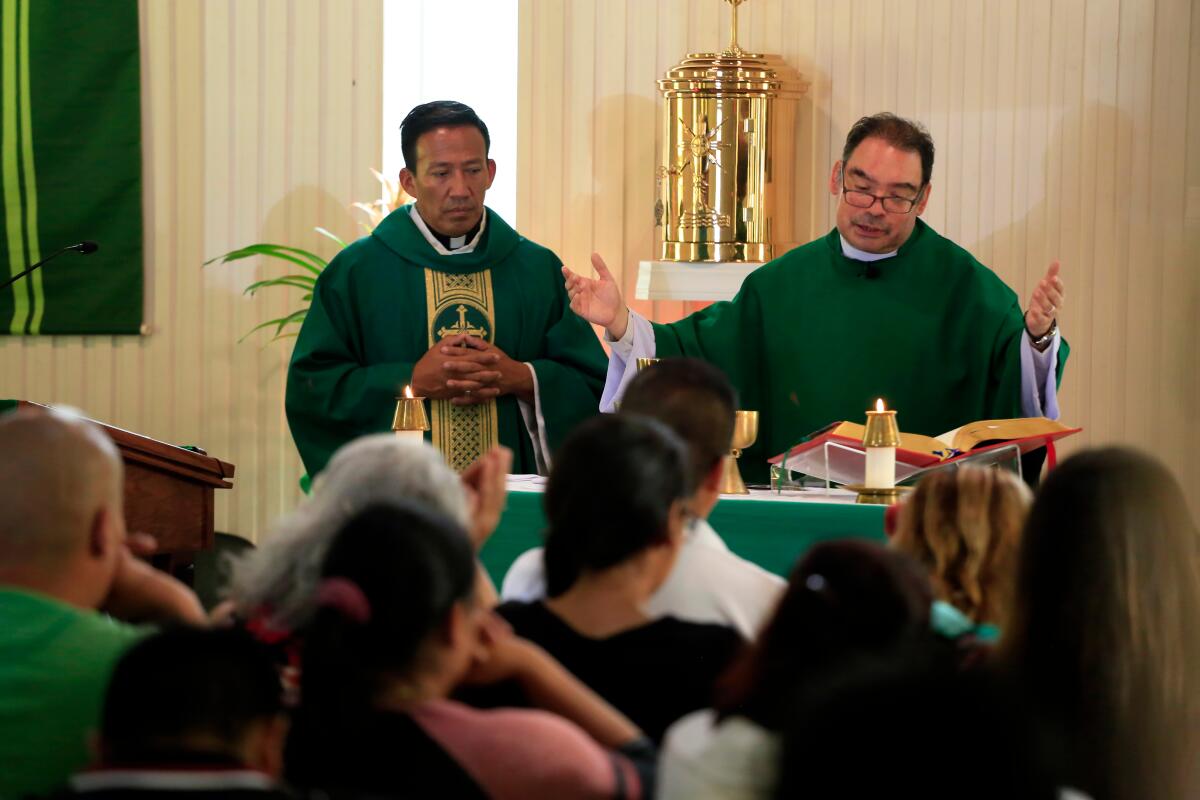
“The peace that Christ brings us is the fruit of a continuous and hard struggle against the evil that seeks to grow in us and around us,” he said. “The peace that Christ brings us is the serenity of knowing that we are in the hands of God, in friendship with Him and with our brothers.”
The church would always support them, he said, and they in turn would gather strength by stepping out of their comfort zones and reaching out to console one another.
“Brothers, we are in the middle of a world that appreciates other values, that reasons with a mentality that is not that of Christ and that often reacts with indifference, hostility, mockery,” he railed.
“We only have one thing to propose to the world: the cross of Christ that must be followed without compromise. We will be a sign of contradiction, but we will change the world, as Christ promised us, building the civilization of love.”
After the service, as Mena shook hands with worshipers outside, a huddle of families waited to talk to him about letters of recommendation for family members who were detained.
A few steps away, a 32-year-old Guatemalan woman, Maria, sobbed as she and her husband said their goodbyes. After seven years in Mississippi, the raids had prompted them to decide to leave for Alabama.
Not only had they lost their jobs at a poultry plant in Morton, but their girls’ godparents were now behind bars and they worried Mississippi was no longer a safe environment for them and their four children.
“It’s too much fear,” Maria said as she embraced a friend and waited to say farewell.
She was not entirely sure Alabama would be safer, but they had family there and they hoped there might be more work.
“I worry,” she said as her 1-year-old daughter slept on her shoulder. “But I have to put my trust in God.”
More to Read
Sign up for Essential California
The most important California stories and recommendations in your inbox every morning.
You may occasionally receive promotional content from the Los Angeles Times.
